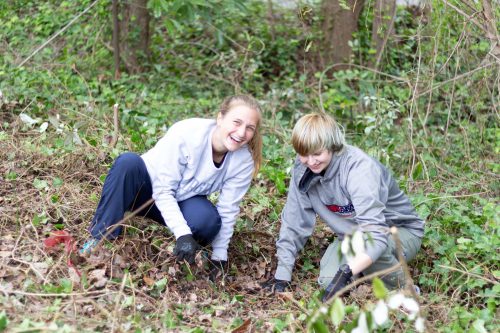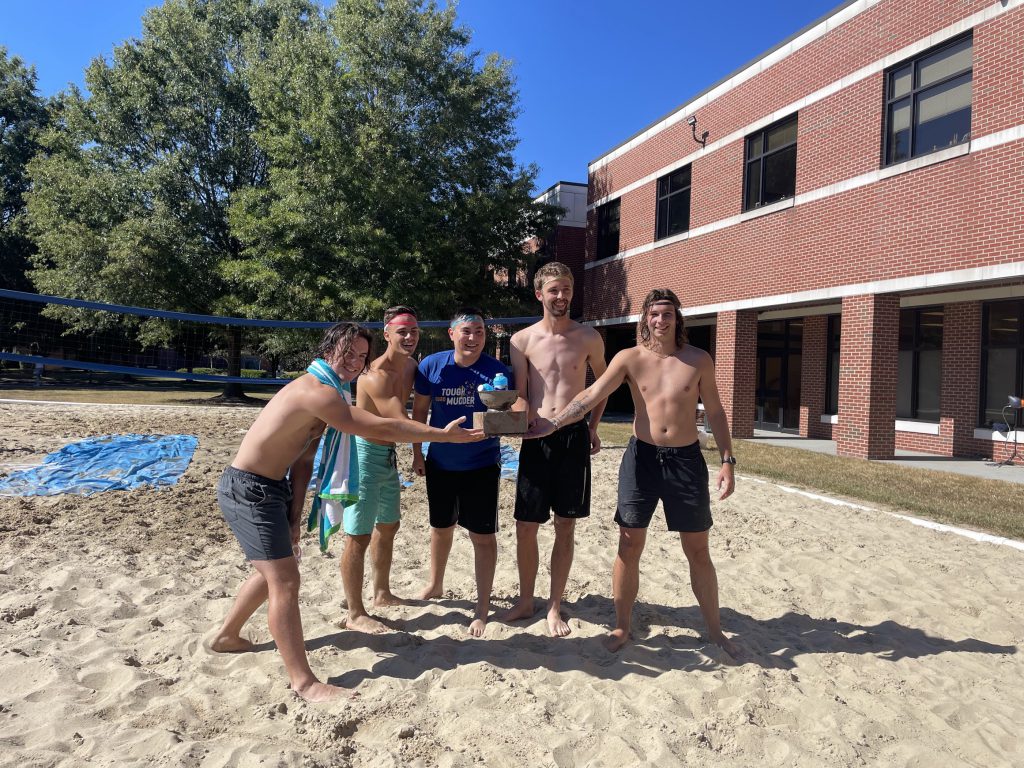Senior Cecilia Aten and first-year Elliot Fylstra clearing invasive species for the garden.
Laila Jones|Marlin Chronicle
Raised garden beds, proposed by Marlins Go Green and installed with volunteer labor, will add greenery and another class to campus.
Community gardens serve as a teaching tool, food resource and gathering place for those in the community. The addition of raised garden beds to Virginia Wesleyan’s campus is meant to do just that. Marlins Go Green (MGG), a student organization focused on sustainability, collaborated with Dr. Eric Johnson, associate professor of Biology, Greer Environmental Sciences Center greenhouse supervisor and coordinator of general education, to organize this project from start to finish. The project was completed recently and was first pitched over a year ago.
This past month, a group of volunteers built the garden beds, which now sit adjacent to the greenhouse. The group mostly consisted of MGG members, led by organization president senior Cecilia Aten, and Johnson.
MGG regularly hosts events themed around sustainability and conservation, such as an upcoming sustainable clothing swap event on Sunday, April 21. The idea for the raised garden was thought up by Aten some time in 2022.
“I applied for the grant for the raised garden beds because I was like, ‘this would be really cool for Marlins Go Green to do,’” Aten said.
The project was funded by a grant offered through Virginia Wesleyan. Dr. Elizabeth Malcolm, professor of Ocean and Atmospheric Sciences, director of sustainability and moderator for MGG, spoke to the specifics of the grant.
“Every year in the fall, we put out a call for grants, and students can submit grants for what could be campus sustainability projects like this one,” Malcolm said. “It could also be bringing speakers to campus, getting things they need for their research projects or anything like that related to either campus sustainability or education on the environment’s sustainability.”
The grant is intended for projects or education opportunities that will last, in an effort to have an effect on many classes of students. “We want to make sure that whatever campus sustainability project that’s done, that once the students leave or graduate, or if they’re gone in the summer, whatever it is—there’s somebody who can maintain that [project] after they’re gone,” Malcolm said.
While most students are only here through the fall and spring semesters, most of the harvests from the gardens will occur in the summer. To accommodate this, students from Tidewater Collegiate Academy, located at the Blocker Youth Center on campus, will keep up with the gardens during the summer.
Even after applying for the grant, it took some time to get the ball moving. Aten needed approval for her selected location for the beds, along with other planning measures. During the wait, Malcolm suggested that Aten approach Johnson about her initiative. That is when the plan began to bloom.
Johnson has been managing the greenhouse for over 10 years and was all in for starting a garden. In addition, he proposed teaching a course to go along with it.
“I had been thinking about how to get some sort of community garden class running,” Johnson said. VWU previously offered a course involving beekeeping in the Pollinator Garden area near Greer. This is what Johnson aims to base his course on.
“With [MGG’s] installation of the garden, I was able to, sort of, get a class passed in the same realm of that bee class,” Johnson said. “It’s going to be a couple of afternoons every spring where students are going to learn about managing the garden, doing stuff like hydroponics and just some sort of cloning plants in the greenhouse and things like that.”
This 2 credit course will first be offered during Spring 2025 and will be in a science discipline, likely Biology or Earth and Environmental Sciences. As of its current capacity, there are only two garden beds, but this number will likely triple to six garden beds to accommodate the course and total student population, according to Aten.
While the greenhouse can only be maintained by a select number of people, having a garden that is accessible to the entire campus is meant to improve campus life for all students. The garden beds will soon be available for all Marlins to partake in—to grow their own goods, take what they need and leave what they don’t.
“You see a cucumber, you want a cucumber, you take it. The whole purpose is just that it’s there for you. It’s there for you to do stuff, to learn, to experiment; maybe in the future, for independent research,” Aten said. “If you want to try doing a different compost on one half of the garden bed, versus this, you know, synthetic compost, versus organic compost, and kind of seeing different reactions on that and then testing it or doing whatever—really just whatever you want to make it.”
To get involved with Marlins Go Green or learn more about the garden beds, reach out to them at marlinsgogreenvwu@gmail.com. Marlins Go Green is currently planning other projects, such as rain collection barrels, according to Aten, funded through the Student Government Association.
By MJ Matthews


